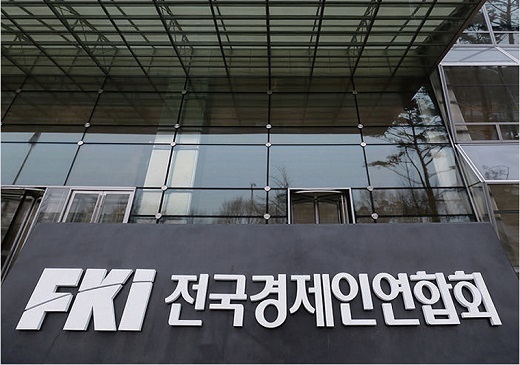 |
(FKI) |
The Federation of Korean Industries said Monday it submitted to the government its opposition to the introduction of punitive damages compensation and class action lawsuit systems.
The opposition came as the government had announced an amendment to the Commercial Law last month to more precisely monitor conglomerates in the form of allowing class action suits, something that had not been legally allowed in the country before.
The FKI estimated that if the government’s legislative notice is passed, the legal costs could add up to 10 trillion won ($8.7 billion) -- 8.3 trillion won for punitive damages and 1.7 trillion won for class action suits -- for the country‘s 30 largest conglomerates. This is a six-fold increase from the current legal cost estimate of 1.65 trillion won.
“(We understand) the purpose of introducing a class action lawsuit system and a punitive damages compensation system is to efficiently rescue victims. However, as the US case shows, only lawyers in charge of litigation will end up pocketing huge profits,” the FKI said, citing the case of American video rental firm Blockbuster Video.
In 2001, US consumers filed a class action lawsuit against the video rental chain for unfairly charging overdue fees. In the end, consumers ended up receiving only $1 coupons, which could only be used for four months while the plaintiffs’ lawyers earned $9.25 million in fees.
The association is also concerned about excessive lawsuits against companies.
The current securities group lawsuit has a rule that “one lawyer can be involved in up to three cases in three years” in order to prevent abusive litigation. But, the government’s pre-announcement of the legislation of the class action law has eliminated the limit. By allowing lawyers to file class action suits without restrictions, there is room for professional brokers to instigate lawsuits, the FKI said.
“The low cost of participating in class action suits and the low burden of losing will also be the cause of abusive litigation. In particular, punitive damages can be a factor that encourages lawsuits as they can expect up to five times more compensation than actual damages,” the FKI said.
The FKI said the biggest victims of the government’s legislative notice are likely to be companies. Even currently, Korean companies are struggling with heavy criminal penalties, administrative sanctions and civil lawsuits it said.. If class lawsuits and punitive damage compensation are introduced again, normal management activities will be difficult, the organization said.
“The most urgent policy priority now is to improve unreasonable regulations to overcome the economic crisis,” said Yoo Hwan-ik, head of the FKI’s corporate system division. “It is not the time to hastily introduce a system that adds uncertainty to corporate management like the government’s legislative notice.”
By Shin Ji-hye (
shinjh@heraldcorp.com)








